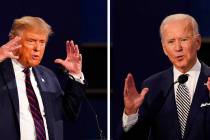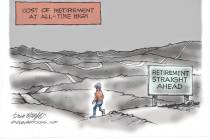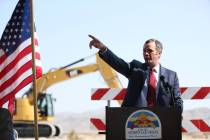FreedomFest: Shrink government, grow opportunity
Las Vegas certainly knows conferences and conventions, hosting more than 22,000 of them in the past year alone. This week, from Wednesday through Saturday, the City of Lights is hosting a different kind of gathering, a political summit where some of the best minds in free market principles will further ideas geared toward advancing liberty. As the promotional materials proudly state, “The World’s Largest Gathering of Free Minds” is “an intellectual feast in the entertainment capital of the world.”
At the core of all discussions sits the fundamental question: What role does government have in America? For virtually all FreedomFest participants, the answer is very little.
For example, the federal tax code is beyond redemption. Back in 1986, countless tax shelters were eliminated, brackets were reduced down to two and the top rate was whacked from 50 percent to 28 percent. But the tax code was maintained.
Now, we should kill the current code and institute a flat tax. Sen. Rand Paul, R-Ky., recently introduced his Flat And Fair Tax, written in conjunction with FreedomFest headliner Stephen Moore. While my flat-tax proposal calls for a 17 percent tax rate for all, and Sen. Paul’s is 14.5 percent, both would sharply reduce Uncle Sam’s reach into Americans’ pockets and substantially lighten the burden on productive work, risk-taking and success.
As Mr. Moore summarized, the “explosively pro-growth and pro-jobs” proposal “is a tax plan that will add to American dynamism by lowering tax distortions and by reducing the role and size of government in our lives.” Other presidential candidates are readying their own flat tax proposals.
Another form of taxation is regulation, which particularly threatens technology and communications industries. According to some estimates, employment growth in science and technology jobs has outpaced gains across all other sectors 27 to 1 since 2002.
But the Federal Communications Commission now threatens the Internet with regulations meant for the old telephone industry. Congress should repeal these suffocating rules that will otherwise sap the vitality of the Internet.
The FCC must also stop playing favorites. For instance, in the upcoming auction of electromagnetic spectrum, T-Mobile wants to rig it in its favor. Auctions should be free from government interference. Rather than play referee, policymakers should support solutions that make more spectrum available to consumers, such as legislation introduced by FreedomFest participant Sen. Marco Rubio, R-Fla.
Congress must also permanently authorize the overwhelmingly bipartisan and soon-to-expire Internet Tax Freedom Act that bans states and municipalities from taxing Internet access. Doing so would directly benefit users, especially those in lower-income brackets for whom the Internet is a crucial avenue to education, opportunity and upward mobility.
Congressional leaders such as Sen. Harry Reid, D-Nev., should also legislate to undo the burdensome utility regulations imposed by the Obama Administration last month. The Internet is not a telephone, nor is it a utility; treating it that way will send the Internet the way of the phone.
Most FreedomFest attendees deeply believe in free trade. American businesses of all sizes increasingly depend on access to international markets for buying and selling goods and services that expand our economy, create jobs and increase economic efficiency in nearly every sector of the economy. In today’s global economy, the U.S. must ensure it is on equal footing with its economic peers.
We must unite to broadly support free trade agreements. These invaluable tools provide a boon to the American economy. In 2014, nearly 50 percent of U.S. exports went to countries with which we had free trade agreements. Since 2009, America’s total exports have grown by roughly the same percentage, contributing almost one-third of U.S. economic growth. Workers and the economy benefit as a result.
Now and in future administrations, elected leaders must continue the aggressive path toward globalization and the protection of the U.S. abroad. Letting other nations do deals without us hurts American workers, our economic output and our long-term ability to compete in the global marketplace.
America is still the land of opportunity. To keep it that way, we must heed the words of FreedomFest participants by limiting government intervention and maximizing opportunities.
Steve Forbes is chairman and editor in chief of Forbes Media.























